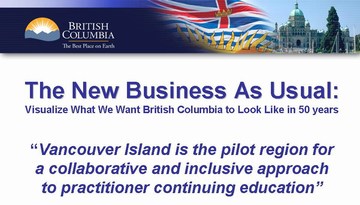Living Water Smart: Doing Business Differently in British Columbia

Living Water Smart provides over-arching policy framework for ‘Beyond the Guidebook’ initiative
VICTORIA: Healthy water and watersheds are vital to B.C.’s economy. Sustaining them is an important investment for the B.C. government, for everyone who does business in the province, and for the public at large. A fresh and flexible approach is required to deal with ever increasing and competing water demands and climate risks.
Create Liveable Communities / Protect Stream Health
Released by Environment Minister Barry Penner on June 3rd 2008, Living Water Smart will change the way British Columbians do business around water. If you are a farmer, developer, planner, business owner/operator, or associated role, these actions will affect you. Just as we are now beginning to consider energy costs in the planning of roads, buildings, towns and t ransportation choices, we must consider stream health when making these same decisions.
ransportation choices, we must consider stream health when making these same decisions.
Doing business differently requires changes to our values, attitudes, and actions for water use. This is essential since rivers and lakes require certain amounts of water at different times of the year to protect natural ecosystem functions like cleaning river beds and fish rearing. The plan will work in conjunction with protecting surface and groundwater across the province, ensuring sufficient water for agriculture while shifting to stronger water conservation and efficiency measures in all sectors.
By 2012, all land and water managers will know what makes a stream healthy, and therefore be able to help land and water users factor in new approaches to securing stream health and the full range of stream benefits.
Since streams and rivers run across jurisdictional boundaries, effective stewardship requires a common set of management principles, regardless of the land jurisdiction or ownership. Development and resource use must consciously consider the effects on stream health and make sure the long-term and life-cycle costs of land use decisions avoid unforeseen future ecological and economic costs.
By using water more responsibly, the B.C. governments can save on the costs of water infrastructure and energy, reduce the need to find new water supplies, and protect water quality for healthier communities. Businesses can save money, and enhance their competitiveness.
To Learn More:
To find more information about B.C. government commitments to doing business differently, click on this link to Living Water Smart..
To read other Living Water Smart stories posted on the Water-Centric Planning Community-of-Interest, click here.
Doing Business Differently and going Beyond the Guidebook
Living Water Smart provides the over-arching policy framework for Beyond the Guidebook: The New Business As Usual, a provincial initiative that builds on the foundation provided by Stormwater Planning: A Guidebook for British Columbia, published in 2002.
The Guidebook set in motion a chain of outcomes that has resulted in British Columbia being recognized internationally as a leader in implementing a natural systems approach to rainwater management in the urban environment. Beyond the Guidebook connects the dots between the water balance methodology that is at the heart of the Guidebook and stream health protection.
Through implementation of “green infrastructure” policies and practices, the desired outcome in going Beyond the Guidebook is to apply what we have learned at the site scale since 2002…so that we can truly protect and/or restore stream health in urban watersheds.
Vancouver Island is the pilot region for implementing Beyond the Guidebook: The New Business As Usual through a precedent-setting approach to continuing education for local government practitioners, namely the Learning Lunch Seminar Series.


